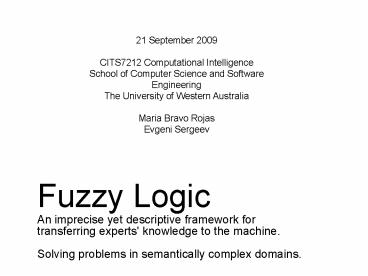Fuzzy Logic - PowerPoint PPT Presentation
1 / 20
Title:
Fuzzy Logic
Description:
Create FL memberships functions. Create pre/post processing FL routines. Test and tune the system ... Fuzzy expert systems, CRC Press, Boca Raton, FL, USA, 1992. ... – PowerPoint PPT presentation
Number of Views:106
Avg rating:3.0/5.0
Title: Fuzzy Logic
1
21 September 2009 CITS7212 Computational
Intelligence School of Computer Science and
Software Engineering The University of Western
Australia Maria Bravo Rojas Evgeni Sergeev
Fuzzy Logic An imprecise yet descriptive
framework for transferring experts' knowledge to
the machine. Solving problems in semantically
complex domains.
2
(No Transcript)
3
(No Transcript)
4
(No Transcript)
5
(No Transcript)
6
(No Transcript)
7
(No Transcript)
8
(No Transcript)
9
Different objectives
Fuzzy Logic affords us a fusion capability
Many variables
Several constraints
Simple causal relationships (known qualitatively)
10
How to use Fuzzy Logic
Define control objectives and criteria
Determine I/O relationships, choose input
variables
Build the IF X AND Y THEN Z rules
Create FL memberships functions
Create pre/post processing FL routines
Test and tune the system
11
Applications
- Knowledge based systems
- Fuzzy sets and multi-criteria coating selection
12
Applications
- Fuzzy controls
- Intelligent wheelchair
13
Intelligent wheelchair
14
Software and Hardware architecture
15
Reactive Shared Controller (RSC)
User
Human Machine Interface
RSC
Intelligent obstacle avoidance behaviour (IOA)
Decision making module
Wheel chair
Contour following behaviour
Collision detection behaviour
World
Sensors
16
IOA fuzzy-logic controller
Knowledge Base
- Rule base fusion of
- Goal behaviour
- OA behaviour
- Fuzzy sets
Sensor data
Fuzzy output
Inference Process
Fuzzification
Defuzzification Process
Actuators
Goal/Path
17
Research Lofti Zadehs FLu
Fuzzy-Logic (FL)
Precise reasoning
Imperfect information
p-Valid (provably valid)
Unprecisiated Fuzzy-Logic (FLu)
Imperfect information
Imprecise reasoning
f-Valid (fuzzily valid)
Imperfect information is information which in one
or more respects is imprecise, uncertain,
incomplete, unreliable, vague or partially true.
18
FL and FLu solutions
p-valid solution
f-valid solution
19
FLe Extended Fuzzy Logic
- FLe FL FLu
- Conceptual system of reasoning, deduction and
computation in which the objects of discourse and
analysis are, or are allowed to be, associated
with imperfect information.
20
References
Kaehler S., Fuzzy Logic an Introduction,
Encoder, March 1998. http//www.seattlerobotics.or
g/Encoder/mar98/fuz/fl_part1.html Kandel A.,
Fuzzy expert systems, CRC Press, Boca Raton, FL,
USA, 1992. Kantrowitz M., Horstkotte E., Joslyn
C. et al. Answers to Questions about Fuzzy Logic
and Fuzzy Expert Systems, Fuzzy FAQ, School of
Computer Science, Carnegie Mellon University,
March 1997. http//www.cs.cmu.edu/Groups/AI/html/f
aqs/ai/fuzzy/part1/faq-doc-0.html Kosko, B. and
Isaka, S., Fuzzy Logic, Scientific American,
vol. 269, 76 - 81, July 1993. Lind S., Bachmann
F. and Stützer S., RockOn Fuzzy,
2009. http//www.timtomtam.de/rockonfuzzy/































